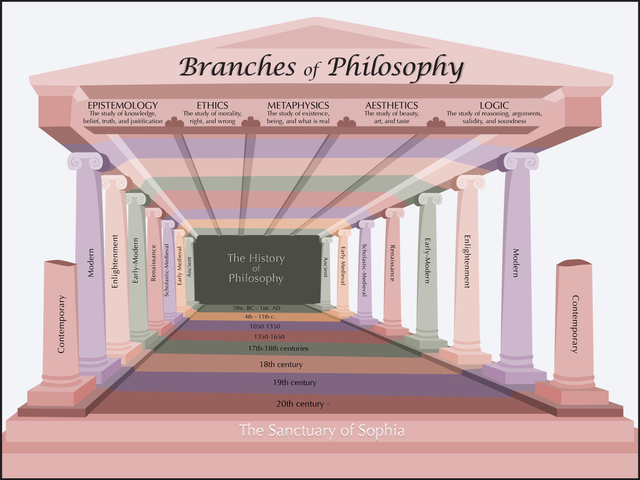PHILOSOPHY | PART 2 | - Metaphysics
Previous - cz.1 [link]
Reminder
In the first part, we took up the introduction - this is usually the case with introductions. We discussed what is - roughly - philosophy, on which areas it divides and how it can be used in life. The last issue seems to me particularly important, because no one would think about philosophy, if it wouldn’t have any constructive, practical sense. Do not be ashamed of looking for practical applications. It should be demanded.
We have listed five components of philosophy: metaphysics, epistemology, ethics, aesthetics and logic, which in this context can be properly renamed to the sphere of politics - as was mentioned in the previous text.
This time, we will deal with (chronologically) – metaphysics.
Metaphysics - what is it?
Metaphysics is a concept that defines the nature of being, that is, everything that surrounds us and ourselves - reality. The unofficial creator of this concept is Aristotle.
![]()
This "defining the nature of reality" can be understood as reflecting on such questions about reality as:
- what reality is
- what is the reason for its existence
- what look at it is the best
and so on..…
Of course, I do not even intend to reply - in this short post - to all possible questions in this field and from every approach so far developed by various schools of philosophy.
The question of what reality itself is, what the cause is, I personally find it to be pointless. Without distinction what reality is, it is what we live in, it is enough to intuitively understand the very notion of reality. For a man, as a species and as an individual, considering the reasons for the creation of reality is also not very important - no difference whether, for example, reality has been created itself, whether it was created, has it always been, etc. - its exists and for us people, as its components, only this is really crucial. What is more important - in my opinion - is the question about the way in which we perceive reality. Here the division is actually between only two options:
- subjective reality
- objective reality
Reality - subjective or objective

Subjective reality means that:
- everyone perceives reality differently, to the extent that it excludes ordinary imperfections of the senses;
- there are no objective, universal truths, concepts;
A different perception of reality means here not only the fact of a different observation resulting from different sensory senses in individual people - one man has better eyesight (thus a certain color will be more intense for him), a different better hearing (some sound will be more powerful for him) etc. Different perception means in this case a completely different, subjective definition and perception of everything - including the notions of truth, justice, honor, etc. If you acknowledge reality as absolutely subjective, you should assume that everyone has the right to define everything, including the words "truth", and even whether any objects exist or if any events have taken place.
Subjectively, the perception of reality can be summarized in a short, well-known quote: "everything is relative."

Objective reality means that:
- imperfections of the senses affect the perception of reality, but it is possible to reach common, universal consensus in both material and conceptual matters;
- universal, objective truths, concepts exist or are possible to develop;
In the case of objective reality, it can be concluded that some imperfections, differences in sensory sensitivity affect the perception of reality (eg as a result of minor differences in the construction of eyeballs for someone the same chair is more red than for someone else), but these differences can be considered natural , negligibly small and in spite of their existence, develop a general, universal consensus on the basics - whether objects exist or events took place, definitions of concepts. Therefore, an objective approach to reality means that - colloquially speaking - eg a table is a table for all observers, murder is a murder for all observers, and for example truth as a concept is understood by everyone in the same way.
Next - the objectivity of reality does not concern the universality of the evaluation of the components of reality, but the universality of their definitions. One can argue, for example, whether any statement is true, but after the existence of a universal definition of truth, one can not argue about the very definition of the word "truth".
How to choose? Does it matter?

So - how to decide if reality is subjective or objective?
The answer is (in my opinion) short - it can not be done ... and it is not worth considering.
If you can not say with certainty what the reality is, does choosing one matter? Does it matter where we will (or choose to) live?
Since it is not possible to state scientifically (as for now) or logically deduce the nature of reality, it might seem that the whole pondering over it does not make sense and that everyone can "choose for themselves" subjective or objective by accident - eg by throwing coin. However, it is good to look at the consequences of accepting each position. Assuming the subjective nature of being, both the individual person and the whole species accepts the lack of universality in all areas of life, the lack of a single definition of anything. People can not build within their civilization the concepts of "truth", "justice", "crime", "wickedness" and all others. Without these key definitions, neither the logical reasoning of the individual is possible (reasoning is based on concepts, definitions, facts and conclusions) and the functioning of the collectivity, which is (de facto) drawing consensus from the reasoning of individuals. Humanity can not develop, for example, the notion of justice, since every person can subjectively define justice in a different way.
A world filled with people, each of whom can completely imagine each element of the environment and interpret every thought on any topic differently than another man with the same thought, is doomed to eternal, impossible to resolve (due to lack of objectivity) disputes, preventing any communication. Communication that is necessary for all achievements of civilization.
Conclusion
The concept of metaphysics is - how, I hope, I managed to show - quite extensive and important. Next components of philosophy depend on it - epistemology, ethics, aesthetics and logic / politics.

Despite the fact that it is impossible to state clearly by scientific methods or purely logical nature (subjective or objective) of being / reality, it is possible to indicate the right one to choose - because of human existence, existence and functioning of humanity. Of the two, only objective reality - allowing for the construction, reconciliation of universal concepts, ideas - enables the building and operation of societies, communities, human civilizations. This is - in my opinion - a sufficient argument to support the objective reality.
End of part 2
In the next part we will deal with epistemology.
Picture: The School of Athens - Rafael Santi

I invite everyone to comment.